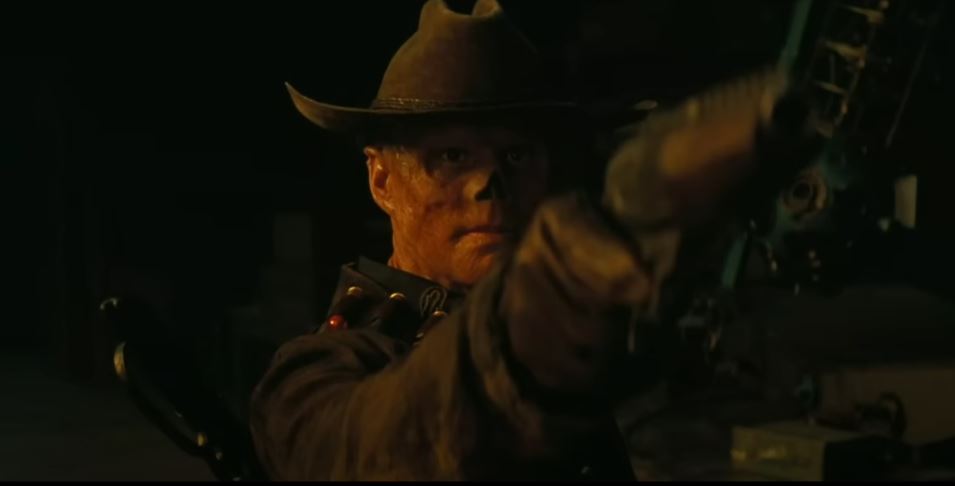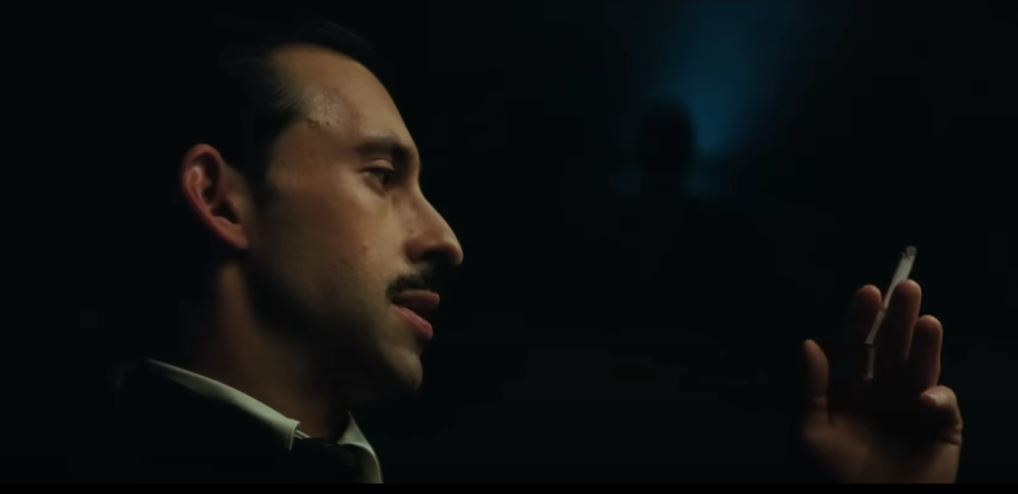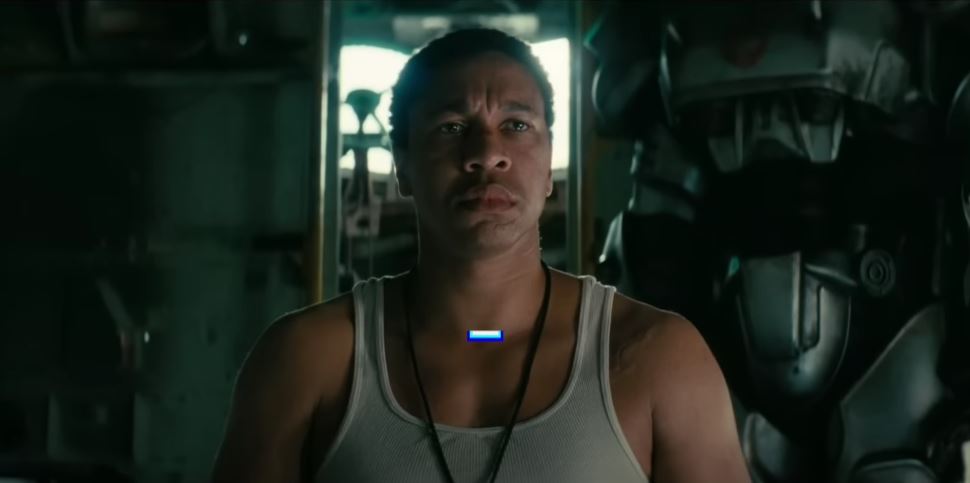Here we are, after seven quality episodes, with the finale to Fallout’s debut season. For those who haven’t read my previous recaps here at The Fandomentals, the headline here tells you all you need to know about my opinion of the show. Fallout grabbed me from the first episode and has never let go. This includes the finale, which had the responsibility of wrapping up a significant number of running plot threads.
Still, there’s no doubting that the finale was also the most controversial episode, with a potentially massive change to the very foundations of Fallout lore. Was it a good or bad change? Let’s talk about it.

The aptly named “The Beginning” sees Lucy finally complete her season-long quest of hunting down Moldaver to find her father, Hank. Honestly, this scene and the lesser revelations alone are excellent, with every actor expertly portraying the experiences, ancient and recent, which shaped them into the people they are now. We find out that Lucy’s mother, Rose, discovered signs of life outside Vault 33 and took both her and Norm to live in Shady Sands, and all the flashbacks we see with them were during that time. We also find out that Hank was responsible for the nuking of Shady Sands, as a form of payback against Rose while also significantly weakening a competitor to Vault-Tec’s post-War societal dominance.
Then we also find out that Rose has survived as a ghoul, whom Moldaver has kept with her despite Rose being feral.
It speaks to the revelations to come that this was not the biggest lore bomb Fallout drops in this episode. The nuking of Shady Sands was such a bomb to set off within the fandom already, with many speculating about who could be responsible. Whatever you think of this from the lore perspective, it is undoubtedly a captivating development for this plot and these characters, and one I absolutely love from that perspective.
Despite everything Lucy has been through, she has remained a positive do-gooder guided by the lessons she learned growing up in the Vault. She values community, and the shared mission of making community, and through them the world, a better place. These are lessons her father would have played a major role in instilling within her. Her reasoning for convincing Maximus to give the fusion core back to Vault 4 is that she could not face her father after dooming an entire settlement to death.
Finding out he did exactly that with Shady Sands is the biggest blow yet to the way Lucy viewed the world, and it’s delicious drama that it was Hank’s lessons that were so important to Lucy siding with Moldaver over him.
Ultimately, Hank is only concerned with the health and future of Vault-Tec. We also find out the truth of Vault 31 in this finale, where Norm discovers the Vault full of cryogenically frozen Vault-Tec managers from before the war. These people were frozen with the intention of them and their kin being the leaders of the new world, and whenever a new overseer was needed, one of them was unfrozen to take that role.
This included both Hank and Betty Pearson, as well as Stephanie, who is now overseer of the resettled Vault 32. Their loyalty is purely to Vault-Tec, with the idea that they would establish the company’s monopoly over the new world.
Lucy cares about the world. At her core, she is her mother’s daughter, who cared more about promoting the fledgling civilizations outside the Vaults and helping them succeed than she cared about corporate supremacy. It’s a real tragedy, especially when Lucy ends up pulling the trigger on what’s left of her mother. Lucy still cares, and is still a good person, but there’s no questioning how the events of Fallout have hardened her. I fully expect her to remain a good person, but this final blow took away a piece of her she cannot take back.
(We also learn that Moldaver was a citizen of Shady Sands as well, and had a close relationship with Rose. Yeah, it was probably gay.)
It speaks volumes that Hank didn’t hesitate to jack a suit of power armor and run off to New Vegas without his daughter. In the grand scheme of things, even she matters less than his corporate overlords. I suppose that, at this point, he has already tried to kill his wife for Vault-Tec. Abandoning his daughter is easier than that.
Somehow, though, this all plays somewhat second fiddle to the biggest lore bomb of the episode, which is the revelation that Vault-Tec planned to assure nuclear apocalypse by dropping the first bomb themselves.
Obviously, there is a great deal of controversy about this development. While I don’t believe the truth has ever been explicit, Fallout games have always heavily hinted that China fired first, as they were on the losing side of the war against the United States. Vault-Tec being responsible is not an unheard-of theory, but falls more on the crackpot side of the discussion. As such, this revelation combined with the Shady Sands/NCR revelation from earlier in the season caused quite the outrage and discussion among Fallout fans.
I suppose we’ll see just how literally we are meant to believe Barbara when she says Vault-Tec will strike first. In a way, the idea makes sense. Vault-Tec’s entire business model depended on the Vaults, and the fear of nuclear war. They obviously were well-prepared for the scenario. Robert House being so sure about the timeline for nuclear war in Fallout: New Vegas makes more sense when he’s literally in the room planning the day it happens.
However, there are plot points we know that call a well-planned strike by Vault-Tec themselves into question.

House mentions that the bombs fell earlier than he planned, so his preparations to shoot them down were not totally complete. On top of that, if Barbara is right there in the room to plan this out, you’d assume she would not risk having her daughter out in the world on the day the bombs dropped, but that is the very first scene Fallout throws at us. It seems like too far of a risk for a woman whose paranoia over protecting her family from nuclear war seems to have driven her to such twisted evil ideas as helping Vault-Tec fire the first bomb.
Even if she hated Coop and didn’t care what happened to him, you would think Janey would be in a Vault with her somewhere.
Of course, Fallout also spends most of the season making you believe that Cooper was caught out in the radiation when the bombs fell, which is why he became the Ghoul, and that Janey must have died. The Ghoul asking Hank where his “family” is, rather than just Barb, suggests Janey did survive somehow, and that there was still some level of control to the timing of the apocalypse. Hank nuking Shady Sands also suggests Vault-Tec still has access to nuclear weapons some 200 years after the Great War, so they surely would have had them back then.
If there’s something that bothers me about this debate, it’s that “who shot first” has never been the point of Fallout. The entire world was primed for, and doomed to, this catastrophe, and someone, somewhere, was always going to pull the trigger. Maybe it was China, maybe it was Vault-Tec, maybe it was an accident gone wrong like the real-life example of a false launch on radar in the 1980s, except no one showed the restraint to avoid firing back.
There’s a part of me that would be happy if Fallout never explicitly confirms who shot first, and we can just add Vault-Tec officially to the list of suspects. The point is not so much whether they did it, but the impact their willingness has on Cooper.
While Fallout has most connected the Ghoul to the larger story happening around him with background connections to everyone involved, this episode was the one that lay bare his explicit involvement, and his larger motivations besides money and survival. He goes after the bounty for the money, because he needs the drugs that keep him from turning into a feral ghoul.
Now that he seemingly has enough of said drug, he can actually chase what he wants, which is the location of his family, which is why he was interested in finding Moldaver to begin with.
This definitely remains as one of the biggest dangling plot threads of the season. The last we see of pre-War Coop and Janey is them running in panic after they see nukes fall on Los Angeles. Considering the mental and physical state of Coop in the modern day, the easy assumption was that Janey died. That he is looking for his “family” suggests the very opposite. Barb and Janey must be alive somewhere, which raises the question of how Janey is alive and presumptively safe, while Coop is a ghoul. How did that happen when they were together during the initial attack?
The revelation that Hank was a pre-War Vault-Tec executive makes chasing him make sense, as he would likely know where Barb was meant to be, presumably cryogenically preserved the same way the rest of Bud Askins’s subordinates were. I doubt she is a brain in a robot like Askins if she successfully took her daughter to safety.
Will either the Ghoul or Lucy get what they want? Well, this is Fallout, so probably not. Fallout is not a grimdark, beat the audience down type of world, but every game, and now this show, makes the explicit, unsubtle point that humanity does not change, and will continue to repeat the same patterns over and over. There are individual or small-scale happy endings, but they come with the caveat that humanity at large isn’t going to be any better than it has ever been, and even those happy endings come with a twist.

We get a relevant example with the Brotherhood assault upon Moldaver at the Observatory, complete with the second “war never changes” line drop courtesy of the Ghoul, as we watch the Brotherhood and Moldaver’s forces tear each other apart over the cold fusion technology retrieved from the scientist’s head.
In the end, Moldaver is dead, with Maximus getting the credit and glory that episode 1 Maximus craved more than anything. But of course, it comes after his travels with Lucy, which have completely overhauled his views of himself, the world, and what he wants from it. He never quite looked like he belonged in the zealous, repressed, glory-obsessed culture the Brotherhood fosters throughout its ranks, nor does he care about securing their own dominance over the world, but now he’ll be charged as one of the more important figures of that mission. After all, he helped secure cold fusion, and the seemingly society-changing advantages it provides.
I’m deeply curious what the Brotherhood will do in Fallout’s second season. At this point, they seem basically unchallenged in the Los Angeles area. Maximus will probably use his influence to encourage the Brotherhood to chase Hank, hoping he can find Lucy again. They will probably have their own motivations to seek out the New Vegas area.
Whatever the future holds for Maximus, Lucy, the Ghoul, and everyone else in Fallout’s weird, wild world, this first season only encouraged my hopes for how it will play out on screen.
There has been a surge in quality video game adaptations in recent memory. Seemingly starting around the time Netflix’s Castlevania series premiered, we have seen these projects reach a point where they are reliably good, or at least good enough to be successful. The awful, disappointing adaptations are increasingly rare. Even if there are recent adaptations I’m not a fan of, they have all been well-received and successful.
If you asked me last year whether a Fallout series would supplant The Last of Us or Arcane for my top spot, though, I would not have believed it possible, yet here we are. Is Fallout the best video game adaptation yet? I think it has a strong case, and it’s my favorite. This is a remarkable piece of entertainment on every level, from its pure merits as a piece of television to the way every aspect faithfully recreated the look and feel of the franchise.
I have to applaud everyone involved in making this excellent, excellent season, and I can’t wait to see what they have in mind for season 2.
Fun Tidbits:
Griffith Observatory was labeled the second capital of the NCR, suggesting there have been multiple new capitals since the demise of Shady Sands. Another lingering question from this season is the current state of the NCR, and this tidbit suggests they at least tried to move on.
My mind remains low-key blown over that meeting between Vault-Tec and all the CEOs of all the other major American corporations, especially the fact that we saw Robert House in live action.
Seeing them sitting around planning out the Vault experiments was also perversely interesting.
The big shootout had so many scenes ripped straight out of a V.A.T.S. sequence in any Fallout game. The Ghoul, especially must have put all his levels into agility for more action points.
It was cool to see Cooper’s scene about the flaw in the power armor he wore during his own military service coming back in the scene where he killed all the Brotherhood knights.
I have to wonder at the implications of successful cold fusion energy, and how that can help rebuild civilization. I hope Fallout doesn’t somehow destroy or erase it to keep the status quo.
So much happened and I’ve talked about so much of it already that I haven’t even mentioned the sneak peek at New Vegas and the deathclaw skull.
Even after everything she went through, Lucy Goosey had an okie-dokie in her at the end.
Images Courtesy of Amazon
Have strong thoughts about this piece you need to share? Or maybe there’s something else on your mind you’re wanting to talk about with fellow Fandomentals? Head on over to our Community server to join in the conversation!

